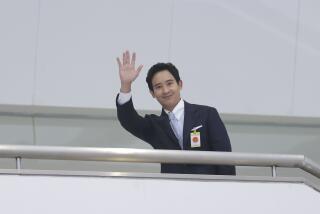National Agenda : Graft and Gunplay Herald Thai Election : * But real issue is: Will army tighten grip?
- Share via
BANGKOK, Thailand — A European government minister remarked with genuine surprise during a recent visit to Bangkok that in Thailand, “democratic government and clean government are presented as alternatives rather than complements.” The quip reflected one of the great ironies of the election campaign now under way in Thailand.
When the military seized power in a bloodless coup in February, 1991, the world condemned the generals, and the United States suspended all financial aid. But after a year in power, the civilian interim government appointed by the military is widely regarded as one of the best the country has ever seen.
Now that democracy has been restored and voters are being asked to select a new Parliament in elections scheduled for Sunday, the newspapers are once again full of accounts of vote-rigging, poll intimidation and outright corruption.
In one two-week period, five local campaigners were gunned down in turf battles for local constituencies. A regional mobster entered his son as a candidate and proclaimed knowingly: “He can’t lose.” Thai newspapers reported that the going price for a party to buy a prominent member of Parliament was 35 million baht, the equivalent of $1.4 million. In Thailand, politicians switch parties frequently, delivering their constituencies to whichever group offers the best deal.
Where else but in Thailand can one candidate, the former Bangkok governor Maj. Gen. Chamlong Srimuang, achieve fame as the sole honest party leader in an election race?
Chamlong is a follower of a devout Buddhist sect and lives a monkish existence, sleeping on the floor, refusing food after noon and remaining celibate in a country known for its permissiveness. Chamlong’s name is consistently No. 1 in opinion polls, but his party’s popularity is confined to the Bangkok area.
Thai politics are bewildering even for Thais to follow: There are 15 parties contesting the election, all with vague names such as the New Aspiration Party.
None of the parties is particularly ideological, and many of them make wild election promises to cut food prices for the poor and raise agricultural prices to farmers.
The real issue is what role the Thai military will play after the elections. Unlike the United States, where the military is clearly subordinate to civilian authority, in the Thai system the military has played an independent and sometimes parallel role.
On Feb. 23, 1991, the commanders of the armed forces seized power from an elected government headed by Prime Minister Chatchai Choonhavan, saying they were acting to halt a slide into corruption. While the Chatchai regime was indeed considered among the most venal in recent memory, it was believed that another reason the generals acted so precipitously was that Chatchai was planning civilian oversight of the military.
Gen. Suchinda Kraprayoon, the army commander, touched off election jitters when he remarked in an interview that he could not rule out another coup when a new administration is installed.
Political analysts and Western diplomats in Bangkok are concerned about the possibility of an outburst of violence if the elections produce no clear winner, as now seems likely. This could derail Thailand’s fast-paced economic development because political stability is viewed as vital to attract foreign investors.
The military has been hinting that if no clear candidate for prime minister emerges, it will seek to have a “neutral outsider” appointed, using a loophole in the recently drafted constitution to go over the heads of elected Parliament members.
To many politicians, the term “neutral outsider” means a prime minister who is both non-elected and probably drawn from the ranks of the generals who led the coup. Anand Panyarachun, a former diplomat who has been interim prime minister for a year, has said he wants to go back into private business.
More to Read
Sign up for Essential California
The most important California stories and recommendations in your inbox every morning.
You may occasionally receive promotional content from the Los Angeles Times.













